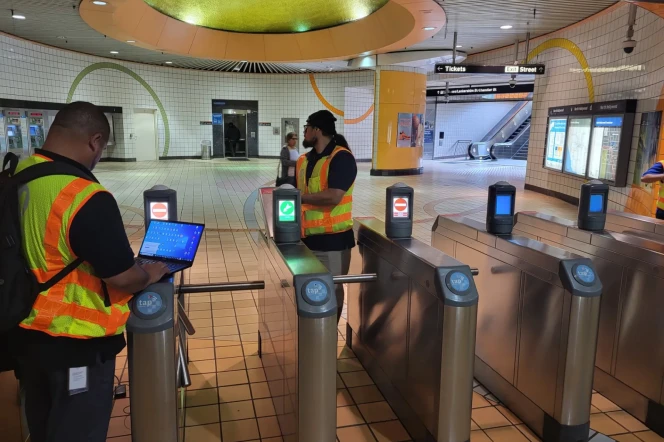With our free press under threat and federal funding for public media gone, your support matters more than ever. Help keep the LAist newsroom strong, become a monthly member or increase your support today.
Proposition 1A would approve bond money for high-speed rail
When the price of gas soared, so did the number of people who took a train to work. But supporters of Proposition 1A would like to give train travel a bigger boost in California. KPCC's Susan Valot examines the ballot measure to float bonds for a high-speed rail system.
Susan Valot: Proposition 1A would approve nearly $10 billion in bonds to begin planning and building California's version of the bullet train. The high-speed train would run at nearly 200 miles an hour along specially built tracks.
Tom Umberg is a commissioner on the California High-Speed Rail Authority, the agency created to oversee high-speed rail development in California.
Tom Umberg: The purpose is to create this rail infrastructure system so that people can travel, for example, from Anaheim to Los Angeles in 22 minutes, or from downtown Los Angeles Union Station to downtown San Francisco in less than two-and-a-half hours – and do it in a way that creates about one-third the pollution that air travel would create, or one-fifth what regular ground auto transport would create.
Valot: The final route hasn't been chosen yet – but the train's planners want it to run from L.A. out to San Francisco, Sacramento, and San Diego. Locally, there'd be six stops from Sylmar to Irvine. A separate line would run east to Riverside, then turn south and head to San Diego.
The Rail Authority's Tom Umberg says the high-speed rail project will create 160,000 construction jobs and several hundred thousand more permanent jobs. And he says it'll relieve congestion at airports.
Umberg: In terms of time, it's going to be more time efficient, number one. Number two, it's certainly more environmentally sensitive. Number three is that you can only expand airports so far.
You can have only so many different places where planes can land. And this system, you can move, you know, you can continue to add trains, as is necessary.
Valot: "But at what cost?", asks Jon Coupal of the Howard Jarvis Taxpayers Association. His group's against Prop 1A.
Jon Coupal: The independent legislative analyst has said that this will take – because of the debt repayment – will take $650 million a year out of the state's general fund. And, as you know, that we're already in a deficit situation and we cannot, we cannot afford to take 650 mill, additional dollars out of the state budget every year.
Valot: Paying off the bonds to build a high-speed rail line would take California 30 years. Coupal says Prop 1A doesn't spell out exactly how the money will be spent. He's concerned about cost overruns. Plus, Coupal says, this is only a down payment on a statewide high-speed rail system.
Coupal: We don't know where it's going, where the route is, where the money's going to come from. They just want the authority to go out and issue almost $10 billion worth of bonds without really thinking through a number of troublesome issues. And so, we think that this proposal is just not ready for primetime.
Valot: But Prop 1A supporter Tom Umberg says this is primetime – and he says we need to do something now.
Umberg: California is going to grow. We're going to have 50 million people here in California in the next 20 years, whether we want that to happen or not, that's what's going to be. And so, if we don't create transportation systems, we're going to find ourselves just absolutely in complete gridlock.
Valot: But Proposition 1A opponent Jon Coupal doesn't buy that gridlock argument.
Coupal: The high-speed rail system is not a commuter rail system. It is meant to transport people over larger distances, not commute distances.
And the traffic congestion we have in California is for people trying to get to work in the morning and trying to get home in the afternoon. The high-speed rail project would do nothing to alleviate that congestion.
Valot: Ultimately, the traffic at the ballot box will decide whether California is all-aboard Proposition 1A's high-speed rail bonds.







